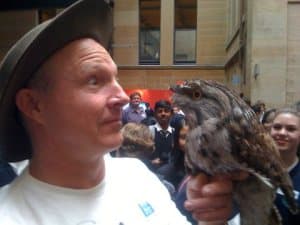
Australian Wildlife Displays – Anthony Stimson
I ran into Anthony Stimson again a little while ago whilst running science workshops at Australian Museum’s Science in the City. Anthony runs Australian Wildlife Displays and visits schools to perform wildlife shows. As such its common for us to run into each other whilst at science festivals and environmental events and have become mates along the way. Whilst watching one of his performances it struck me how much can be packed into a wildlife show; for Anthony, it’s not just about the animals but also the overall conservation message. Anthony approaches shows in the same way a Zoo or an environmental center runs their shows, whereby the following messages are kept front and center:
- the animal’s physiology.
- the animal’s place in the local ecology.
- conservation efforts for the animal or related endeavours.
- what the public can do?
As per any educational show the content is pitched at the correct level for the audience, with opportunities for children to approach the animals and treat them with respect. Unfortunately I’ve seen a couple of other providers go cheap thrills such as ‘here’s the scary snake’ or ‘have a photo with our lizard’ but it often leaves audiences with very little to learn; if anything they learn that wildlife has nothing to do with everyday life and that they can be treated like a theme park ride. Critically a good wildlife show should present animals with their natural behaviours and be less concerned with showing ‘tricks’. So, what can you do to run a respectable wildlife show? A few things:
- get a real background with the animals; work with them in their natural environment as a ranger, keeper or naturalist.
- get an understanding of the animals natural habitat by being involved in bushland regeneration and ecological restoration.
- get the appropriate licenses to case animals to audiences and be aware of local, State and Federal welfare guidelines
- use animals that you’re familiar with and find a mentor to give you further instructions.
- treat the animals well; feed them well, house them well and transport in the best possible conditions.
- rotate animals in front of audiences frequently; give them a rest from prodding hands for as much as possible.
- showcase the real behaviours of the animals and be aware of their social requirements, limitations and dangers.
- discuss conservation efforts of not just the showcased animal but the entire habitat they come from.
- read journal articles and bulletins on your subject; stay up to date with your biological knowledge
Finally, try to make your show accessible to a wide audience; making money is fine but please remember that your knowledge is valuable an can make a real contribution to people’s understanding of their environment and therefore care for it in the future… not possible if they can’t be exposed to your message due to fiscal reasons. Social entrepreneurship is always at the heart of science communication!























Comments